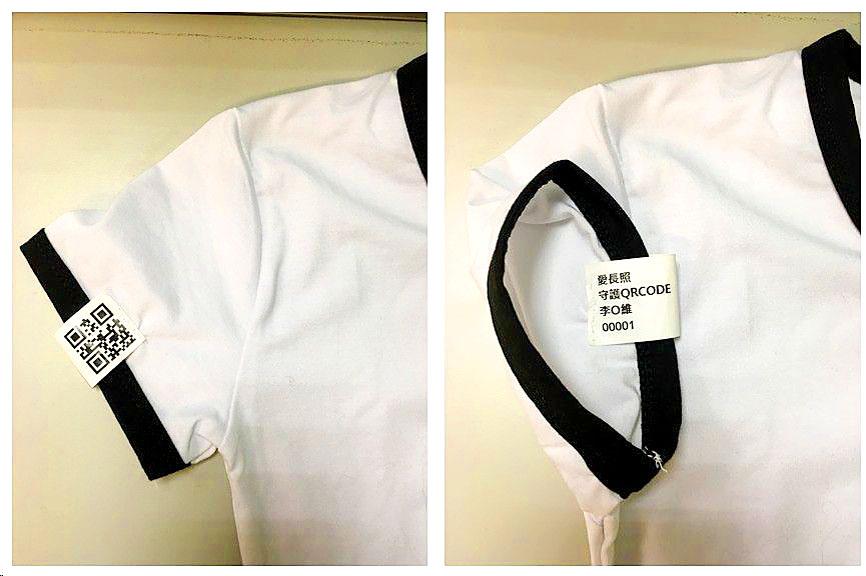Dementia advocacy groups yesterday urged the government and the public to take action against the rising number of incidents of people with dementia going missing, citing Taipei City Government statistics showing 179 incidents last year.
Fang Ting-gung (方定工), an officer at Nangang Police Station in Taipei, said on Sunday last week that older people with dementia might be “mentally stuck” in a time long ago, leading them to think that they must go to work.
This might happen in the middle of the night or in bad weather, which might imperil their physical health, he added.

Photo copied by Cheng Ming-hsiang, Taipei Times
While police use a facial recognition system to identify people with dementia they have picked up, the system only finds matches for about 50 percent of them, as there are no recent photos of them available in the system, Fang said.
Police officers might have to go from door to door to find a missing person’s home, he said.
Fang urged people with relatives with dementia to outfit them with tracker bracelets and install devices that prevent them from leaving home unaccompanied.
There are about 8,700 people with dementia in Taipei, but the Taipei Department of Health has only received 1,751 applications for tracker bracelets, or a 20 percent uptake, the department said.
It would continue to promote the bracelet program, collaborate with the police to establish a fingerprint database and is considering a subsidy for GPS devices for people with dementia, the department said.
Taiwan Alzheimer Disease Association secretary-general Tang Li-yu (湯麗玉) said that the families of people with dementia should adopt multiple measures, including updating the family member’s ID card with a recent photograph.
They should also notify neighbors that they have a family member with dementia so that they can help them if they wander off, Tang said.
They should also consider using daycare services, he said.
Federation for the Welfare of the Elderly secretary-general Chang Shu-ching (張淑卿) said that tracker bracelets have over the past few years become safer and more fashionable.
However, Taipei’s bracelet program is not integrated with those of other municipalities, and changing that would make it more efficient, Chang said.
The central government should increase efforts to educate the public on dementia, as the condition is expected to become more prevalent in Taiwan’s aging society.

A cat named Mikan (蜜柑) has brought in revenue of more than NT$10 million (US$305,390) for the Kaohsiung MRT last year. Mikan, born on April 4, 2020, was a stray cat before being adopted by personnel of Kaohsiung MRT’s Ciaotou Sugar Refinery Station. Mikan was named after a Japanese term for mandarin orange due to his color and because he looks like an orange when curled up. He was named “station master” of Ciaotou Sugar Refinery Station in September 2020, and has since become famous. With Kaohsiung MRT’s branding, along with the release of a set of cultural and creative products, station master Mikan

RISING TOURISM: A survey showed that tourist visits increased by 35 percent last year, while newly created attractions contributed almost half of the growth Changhua County’s Lukang Old Street (鹿港老街) and its surrounding historical area clinched first place among Taiwan’s most successful tourist attractions last year, while no location in eastern Taiwan achieved a spot in the top 20 list, the Tourism Administration said. The listing was created by the Tourism Administration’s Forward-looking Tourism Policy Research office. Last year, the Lukang Old Street and its surrounding area had 17.3 million visitors, more than the 16 million visitors for the Wenhua Road Night Market (文化路夜市) in Chiayi City and 14.5 million visitors at Tainan’s Anping (安平) historical area, it said. The Taipei 101 skyscraper and its environs —

Taiwan on Friday said a New Zealand hamburger restaurant has apologized for a racist remark to a Taiwanese customer after reports that it had first apologized to China sparked outrage in Taiwan. An image posted on Threads by a Taiwanese who ate at Fergburger in Queenstown showed that their receipt dated Sunday last week included the words “Ching Chang,” a racial slur. The Chinese Consulate-General in Christchurch in a statement on Thursday said it had received and accepted an apology from the restaurant over the incident. The comment triggered an online furor among Taiwanese who saw it as an insult to the

ENROLLMENT STRATEGIES: NTNU focuses on English instruction to attract foreign students, and helps them with employment and internships, its president said The number of foreign students in the nation’s colleges and universities hit a five-year high last year, with National Taiwan Normal University (NTNU) topping the list with the most international students, Ministry of Education data showed. Last year, 123,188 international students attended Taiwanese colleges and universities, 3,259 more than the previous academic year, the data showed. NTNU had the most international students, with 7,648 students, followed by the National Taiwan University’s 6,249, it showed. NTNU yesterday said that international students accounted for 12.05 percent of its degree students last year. The percentage of overseas Chinese students at the university has also been the highest